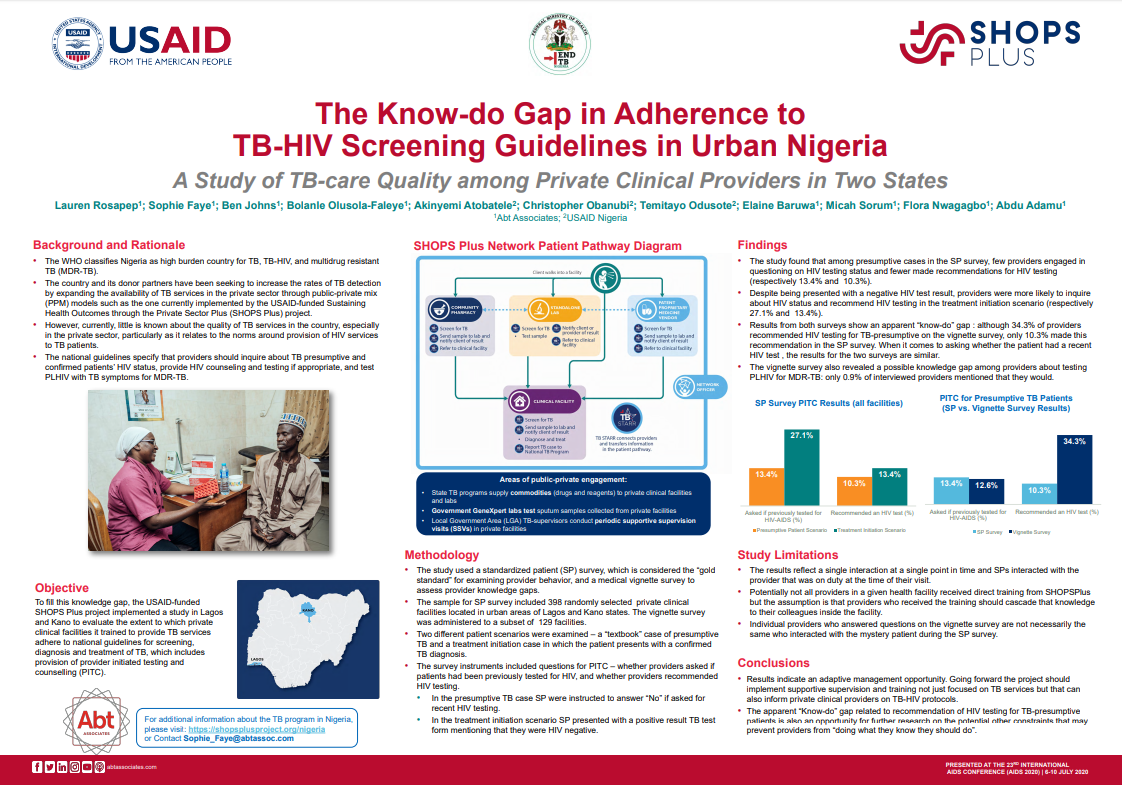
Resource Library
The know-do gap in adherence to TB-HIV screening guidelines in Urban Nigeria
The WHO classifies Nigeria as high-burden country for TB, multidrug resistant TB (MDR-TB), and TB-HIV. Little is known about the quality of screening, diagnosis and treatment of TB in the country, especially in the private sector. SHOPS Plus implemented a study to evaluate the extent to which private clinical facilities it trained to provide TB services adhere to national standards for management of presumptive and confirmed TB. These standards specify that providers should inquire about a presumptive and confirmed patients’ HIV status, provide HIV counseling and testing if appropriate, and test people living with HIV with TB symptoms for MDR-TB. The study used a standardized patient survey, which is considered the “gold standard” for examining provider behavior, and a medical vignette survey to assess provider knowledge gaps. The sample included 398 clinical facilities in urban areas of Lagos and Kano states. Two different patient scenarios were examined—a “textbook” case of presumptive TB and a treatment initiation case in which the standardized patient presents with a confirmed TB diagnosis. The survey instrument included elements on provider-initiated HIV testing and counseling—whether providers asked if patients had been previously tested for HIV, and whether providers recommended HIV testing. The study found that among presumptive and treatment initiation cases, few providers engaged in questioning on HIV testing status (respectively 13.4% and 27.1%) or made recommendations for HIV testing (respectively 10.3% and 13.4%). The vignette survey revealed a knowledge gap among providers about testing PLHIV for MDR-TB (only 0.9% said they would). By comparing results from both surveys, a “know-do” gap is evident: Although 34.3% recommended HIV testing for TB-presumptives on the vignette survey, only 10.3% made this recommendation in the SP survey. Results indicate an adaptive management opportunity for SHOPS Plus. Going forward, the project should implement supportive supervision or training remediation to better sensitize private clinical providers to TB-HIV protocols. A planned follow-up survey before the end of the project will assess effectiveness of such support to improve the quality of TB care provided by SHOPS Plus-affiliated providers. This poster was shared virtually at the 23rd International AIDS Conference.
Resource Type : Infographic
Country : Nigeria
Year : 2020-07-20T12:34:00
Language : English
Project : SHOPS Plus


